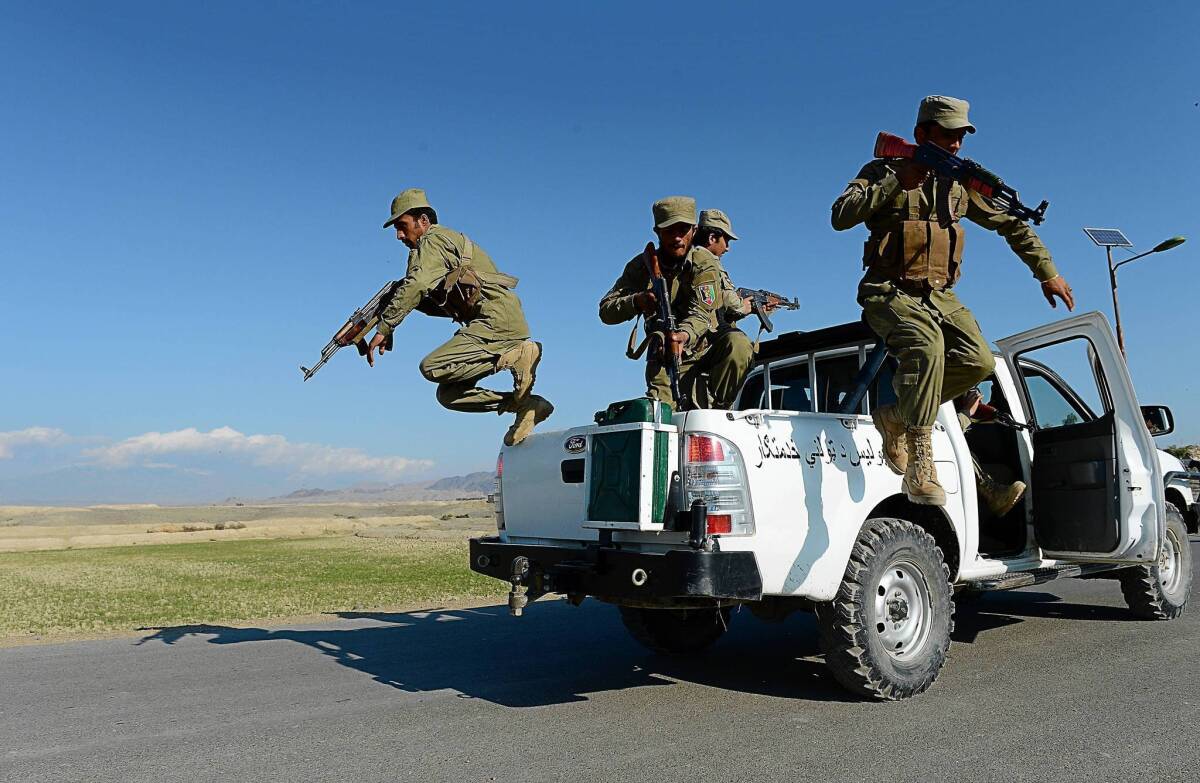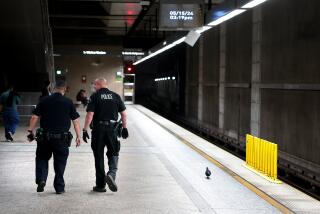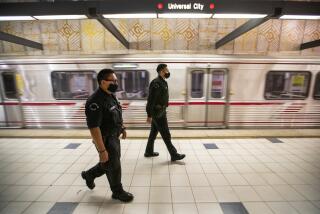Rural Afghanistan force with shady reputation may grow

- Share via
WASHINGTON — In an effort to fight the insurgency after U.S. troops leave Afghanistan by the end of next year, officials in Washington and Kabul are planning to dramatically expand a 3-year-old rural police force that has been implicated in human rights abuses and criminal activity.
The plan by the U.S. Special Operations Command would extend a financial lifeline from the Pentagon to the Afghan Local Police for at least five more years, providing $1.2 billion to train, arm and pay 45,000 fighters, up from a current force of 19,600, according to senior U.S. officials and planning documents.
Despite heavy casualties so far, and a worrisome reputation for corruption and brutality, the paramilitary force would serve as the first line of defense against the Taliban in rural areas beyond the reach of regular Afghan army and police units.
White House officials are still debating the long-term military aid package for Afghanistan and how many U.S. troops will stay behind after 2014. President Obama is expected to outline the drawdown in his State of the Union address Tuesday.
Expanding the controversial Afghan force has won preliminary approval from senior U.S. commanders. They say only a small number of special operations troops based in Kabul would be needed to help the Afghan Interior Ministry run the program, a major selling point with the White House seeking to limit the U.S. military contingent.
The proposal has also won at least tentative support from Afghan government officials. They are increasingly nervous that the insurgency will gain strength after U.S. troops leave, and appear willing to back the effort as long as Washington pays for it.
The expansion “is according to requests from officials in the central government, the provinces and the district level,” said Ali Shah Ahmadzai, the Interior Ministry official who oversees the local police.
When the American-backed units were first organized in 2010, Gen. David H. Petraeus, then the top commander in Afghanistan, described them as a temporary, lightly armed guard force that could fight insurgents in remote areas until enough Afghan army and police units could be trained to take over.
Since then, U.S. commanders have come to view the village fighters as a cheaper alternative to regular Afghan security forces. Lt. Col. Tom Bryant, a spokesman for the U.S. Special Operations Command in Kabul, said they had provided Afghan officials with studies showing how much money they could save by shrinking the army and police and replacing them with rural guard units.
The village guards resemble militias more than conventional police. Fighters are selected by tribal councils, given three weeks’ training, plus small arms, uniforms and pickup trucks. They have no arrest powers, and are not supposed to investigate crimes.
Their mission is to defend their villages from insurgents, and they have borne significant casualties. Officials say 6.2% of the home guard fighters have been wounded or killed, compared with less than 3% of Afghan army and police troops.
Ahmadzai said the force is deployed in 100 of the country’s roughly 400 districts, and 44 more districts will be added in coming months.
But operating in often remote areas, many local units and their commanders receive little supervision by Afghan authorities, and in some cases their loyalties are far from clear.
“Once the NATO forces leave, these [fighters] will turn to the Taliban side,” warned Atiqullah Amarkhail, an independent military analyst who was a senior military officer in Afghanistan’s pre-Taliban government.
So far, defenders say the village guards have helped improve security in some of Afghanistan’s most troubled areas.
In Ghazni, a strategic province south of Kabul, officials say the local units will be expanded in three districts this year to help support a popular anti-Taliban uprising that began last summer.
“The Afghan government sees this as their own program now,” said Maj. Gen. Tony Thomas, who commands U.S. special operations troops in Afghanistan. “It has its naysayers out there, but ultimately we hope it will be funded out to the mid-2020s to give them breathing space” against the insurgency.
Ghulam Mujtaba Patang, the minister of Interior and a former critic, recently endorsed enlarging the force and maintaining it until 2025, according to planning documents. In December, Patang acknowledged misconduct by some rural guards, and said he was reviewing the program.
“Presence of the local police has been effective for providing security at some cases, and has negatively affected areas in some other cases,” Patang was quoted as telling the Afghan parliament.
Some Afghan officials regard the home guard as an erratic and dangerous force whose members are more loyal to their commanders than to the national government.
They warn that giving weapons and training to local tribesmen is a recipe for criminality and warlordism, and will undermine confidence in the Afghan government and the regular army. Expanding the village-based force will only make problems worse, they say.
“I don’t support increasing the number” of local guards, said Sher Aziz Kamawal, the head of security affairs in parliament. Washington “should invest that money in training, equipping and increasing the numbers of the Afghan army.”
In some cases, the home guard units prey on villagers rather than protect them.
At least 77 local police have been investigated for criminal activity, including murder, rape, extortion and bribe-taking. They include Hakeem Shujayee, a local commander in Oruzgan who was arrested last summer after being accused of involvement in dozens of killings and rapes. Despite the allegations, he was later released and is now a fugitive.
“Since his removal from his Afghan Local Police leadership position in the June 2012 time frame, U.S. special operations forces have not had any type of relationship with Mr. Shujayee,” said Bryant, the spokesman for the command in Kabul.
A report last month by the United Nations mission in Afghanistan found that 10 of 12 prisoners interviewed by investigators in the provinces of Kunduz, Kandahar, Faryab and Oruzgan had been beaten or otherwise abused by local police units.
Ahmadzai, the Interior Ministry official who oversees the local police, shrugged off concerns about abuses by some units. “No one can escape from the law, so anyone who commits a crime will face justice,” he said.
Cloud reported from Washington and Bengali from Kabul.
More to Read
Sign up for Essential California
The most important California stories and recommendations in your inbox every morning.
You may occasionally receive promotional content from the Los Angeles Times.















